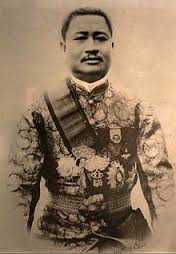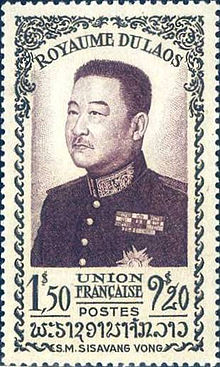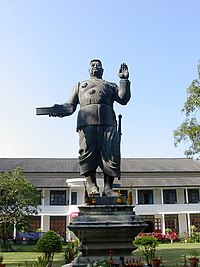Sisavang Vong
| Sisavang Phoulivong | |
|---|---|
 | |
| King of Luang Phrabang | |
| Reign | 28 April 1904 – 20 October 1945 |
| Predecessor | Zakarine |
| Successor | As King of Laos |
| King of Laos | |
| Reign | 23 April 1946 – 29 October 1959 |
| Predecessor | Position created |
| Successor | Sisavang Vatthana |
| Born | 14 July 1885 Luang Phrabang |
| Died | 29 October 1959 (aged 74) Luang Phrabang, Laos |
| Spouse | Princess Kham-Oun I Khamphane Khamla Khamboua Khamtip Princess Khamtouane of Luang Prabang Princess Kamaduni Khamphoui Princess Indrakama Princess Kamuni Princess Khamphoui Chansy |
| House | Luang Phrabang |
| Father | Zakarine |
| Mother | Thongsy |
Sisavang Phoulivong (or Sisavangvong, Lao: ພຣະບາທສົມເດັຈພຣະເຈົ້າມະຫາຊີວິຕສີສວ່າງວົງສ໌) (14 July 1885 – 29 October 1959) was king of the Kingdom of Luang Phrabang and later the Kingdom of Laos from 28 April 1904 until his death on 29 October 1959.
Early life

He was born at Luang Phrabang on 14 July 1885. His father was Zakarine, King of Luang Phrabang and his mother was Queen Thongsy. He was educated at Lycée Chasseloup-Laubat, Saigon and l'École Coloniale, Paris. He was known as a "playboy" king. He had up to 50 children by as many as 15 wives, two of whom were his half sisters[1] and one of whom was a niece. Fourteen of the children died in the Mekong after a boating accident.
His wives included:
- Princess Kamuni (1885–1915)
- Khamphane (1896–1983), his half sister by his father's wife Mom La; they had no children
- Khamla, a commoner
- Khamboua, a commoner
- Khamtip, a commoner
- Princess Khamtouan of Luang Prabang, his half sister (one son)
- Princess Kamaduni of the Vang Hnaxxs family
- Mom Khamphoui, a commoner
- Princess Indrakama, a daughter of Prince Jayasena, Prince Sri Dibudinha and his wife, Pong
- Princess Kamuni, daughter of Prince Ko and Princess Duangbadani
- Princess Khamphoui, the daughter of his half-brother
- Chansy (1900–1984), a commoner
King of Laos
He succeeded his father as King of Luang Prabang after the death of his father, 25 March 1904. Luang Phrabang was then a French protectorate within French Indochina. He ascended the throne, at the old Royal Palace, Luang Prabang, 15 April 1904, and was crowned there, 4 March 1905. During the early years of his reign, the French built a modern palace for him, the Royal Palace of Luang Prabang for his use of residence. Under his kingdom he had united provinces Houaphan, 1931; Houakhong; Xiengkhouang and Vientiane, 1942; Champassak and Sayboury, 1946.
He was a lifelong supporter of French rule in Laos, and in 1945 he refused to cooperate with Lao nationalists and he was deposed when the Lao Issara declared the country independent. In April 1946, the French took over once again and he was reinstated as king (the first time a Lao monarch actually ruled all of what is today called Laos).

Upon Sisavang Vong’s death in 1959, he had ruled Laos for 55 years. He became one of the longest-reigning kings in Asia (the longest being King Bhumibol Adulyadej of Thailand, who surpassed his reign in length in 2001.)
When he became ill, he made his son Crown Prince Savang Vatthana regent. His son succeeded him on his death in 1959.[2] He was cremated and buried in Vat That Luang (Luang Prabang) in 1961, and during his funeral procession was transported by the royal funeral carriage, a 12-metre-high wooden hearse with a carved seven-headed serpent. Many representatives were at the state funeral including Prince Bhanubandhu Yugala, who represented Thailand.
Sisavangvong University was named in his honour, but was abolished in 1975 when the communists took power in Laos.
Because he presided over independence from the French Union, statues of him survived the communist revolution and remain in Luang Prabang and Vientiane. Both statues depict him in the act of bestowing a constitution upon the people.
Honours
- Grand Cross of the Royal Order of Cambodia – 1905
- Grand Cross of the Order of the Dragon of Annam – 1905
- Decoration of the Golden Gong, 1st Class of Annam
- Grand Cross of the Legion d'Honneur of France – 1927 (Commander – 1905)
- Grand Officer of the Order of the Black Star of Benin of France – 1935
- Grand Officer of the Order of the Crown of Belgium – 1935
- Officer of the Order of Arts and Letters of France – 1949
- Croix de Guerre with Palm of France – 1949
- Knight of the Order of the Royal House of Chakri of Thailand – 1955
- Grand Cross of the National Order of Merit of Vietnam – 1955
See also
References
- 1885 births
- 1959 deaths
- Monarchs of Laos
- People from Luang Prabang
- Grand Officers of the Order of the Crown (Belgium)
- Grand Croix of the Légion d'honneur
- Officiers of the Ordre des Arts et des Lettres
- Recipients of the Croix de guerre des théâtres d'opérations extérieures
- Recipients of the Royal Order of Cambodia
- Recipients of the Order of the Black Star
- Laotian anti-communists


